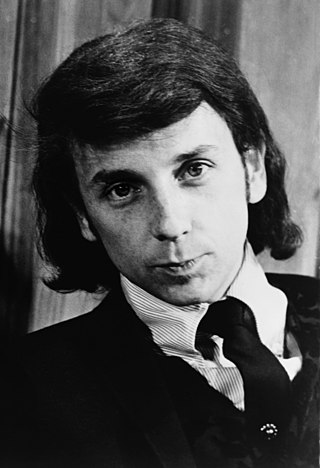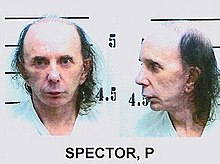In jurisprudence, double jeopardy is a procedural defence that prevents an accused person from being tried again on the same charges following an acquittal or conviction and in rare cases prosecutorial and/or judge misconduct in the same jurisdiction. Double jeopardy is a common concept in criminal law – in civil law, a similar concept is that of res judicata. The double jeopardy protection in criminal prosecutions only bars an identical prosecution for the same offence, however, a different offence may be charged on identical evidence at a second trial. Res judicata protection is stronger – it precludes any causes of action or claims that arise from a previously litigated subject matter.

Lana Jean Clarkson was an American actress and fashion model. During the 1980s, she rose to prominence in several sword-and-sorcery films. In 2003, record producer Phil Spector shot and killed Clarkson inside his home; he was charged with second-degree murder and convicted in 2009.

Henry Chang-Yu Lee is a Chinese-born American forensic scientist. He founded the Henry C. Lee Institute of Forensic Science, affiliated with the University of New Haven. In July 2023, a federal court found that Lee fabricated evidence that sent two teens to prison for 30 years.
Actual innocence is a special standard of review in legal cases to prove that a charged defendant did not commit the crimes that they were accused of, which is often applied by appellate courts to prevent a miscarriage of justice.
On May 22, 1995, 16-year-old Jimmy Farris, the son of a Los Angeles Police Department officer, was stabbed to death. Farris and his friend, Michael McLoren, were next to a clubhouse-type fort in McLoren's backyard. Four acquaintances of Farris and McLoren jumped the chainlink fence and approached the fort. There was a fight inside the fort. Farris and McLoren went into the house, bleeding from stab wounds, while the other four climbed back over the fence and left. Farris died before paramedics arrived. McLoren was airlifted to UCLA Medical Center.

Commonwealth of Pennsylvania v. Mumia Abu-Jamal was a 1982 murder trial in which Mumia Abu-Jamal was tried for the first-degree murder of police officer Daniel Faulkner. A jury convicted Abu-Jamal on all counts and sentenced him to death.
The Double Jeopardy Clause of the Fifth Amendment to the United States Constitution provides: "[N]or shall any person be subject for the same offence to be twice put in jeopardy of life or limb..." The four essential protections included are prohibitions against, for the same offense:

Harvey Phillip "Phil" Spector was an American record producer and songwriter best known for his innovative recording practices and entrepreneurship in the 1960s and his two trials and conviction for murder in the 2000s. Spector developed the Wall of Sound, a production style that is characterized for its diffusion of tone colors and dense orchestral sound, which he described as a "Wagnerian" approach to rock and roll. He is widely regarded as one of the most influential figures in pop music history and one of the most successful producers of the 1960s.

The Supreme Court of the United States handed down nineteen per curiam opinions during its 2009 term, which began on October 5, 2009, and concluded October 3, 2010.

Curtis Giovanni Flowers is an American man who was tried for murder six times in the U.S. state of Mississippi. Four of the trials resulted in convictions, all of which were overturned on appeal. Flowers was alleged to have committed the July 16, 1996, shooting deaths of four people inside Tardy Furniture store in Winona, seat of Montgomery County. Flowers was first convicted in 1997; in five of the six trials, the prosecutor, Montgomery County District Attorney Doug Evans, sought the death penalty against Flowers. As a result, Flowers was held on death row at the Parchman division of Mississippi State Penitentiary for over 20 years.

The murder of Mark Fisher occurred in the early morning hours of October 12, 2003. Where a 19-years old college student was brutally beaten, shot five times, and left on Argyle Road in Prospect Park South, Brooklyn.
People v. Newton, 8 Cal. App. 3d 359, was a controversial appeal arising from the voluntary manslaughter conviction of Huey P. Newton, the reputed co-founder of the Black Panther Party for Self Defense. The California Court of Appeal reversed Newton's conviction due to prejudicial error stemming from the trial court's failure to instruct the jury as to the possibility of involuntary unconsciousness as a complete defense to the charges. Though Newton's attorney arguably withdrew the defense at trial, the Court nonetheless held that the failure to instruct violated Newton's constitutional right to have the jury determine all material issues based on the evidence. This case stands for the proposition that trial courts have an affirmative duty to instruct juries as to a defense of involuntary unconsciousness where there exists evidence that may support that conclusion.

Travis Victor Alexander was an American salesman who was murdered by his ex-girlfriend, Jodi Ann Arias, in his house in Mesa, Arizona while in the shower. Arias was convicted of first-degree murder on May 8, 2013, and sentenced to life in prison without the possibility of parole on April 13, 2015.

Phil Spector is a 2013 American biographical drama television film written and directed by David Mamet. The film is based on the murder trials of record producer, songwriter and musician Phil Spector and premiered on HBO on March 24, 2013. It stars Al Pacino as Phil Spector, Helen Mirren as defense attorney Linda Kenney Baden, and Jeffrey Tambor as defense attorney Bruce Cutler. It focuses primarily on the relationship between Spector and Linda Kenney Baden, his defense attorney in 2007 during the first of his two murder trials for the 2003 death of Lana Clarkson in his California mansion, and is billed as "an exploration of the client–attorney relationship" between Spector and Kenney Baden.

The California Innocence Project is a non-profit based at California Western School of Law in San Diego, California, United States, which provides pro bono legal services to individuals who maintain their factual innocence of crime(s) for which they have been convicted. It is an independent chapter of the Innocence Project. Its mission is to exonerate wrongly convicted inmates through the use of DNA and other evidences.
Foster v. Chatman, 578 U.S. ___ (2016), was a United States Supreme Court case in which the Court held that the state law doctrine of res judicata does not preclude a Batson challenge against peremptory challenges if new evidence has emerged. The Court held the state courts' Batson analysis was subject to federal jurisdiction because "[w]hen application of a state law bar 'depends on a federal constitutional ruling, the state-law prong of the court’s holding is not independent of federal law, and our jurisdiction is not precluded,'" under Ake v. Oklahoma.
Bell v. Cone, 535 U.S. 685 (2002), was a Supreme Court of the United States case that upheld a death sentence despite the defendant's argument that he should not be sentenced to death because he was suffering from drug-induced psychosis when he committed the crimes. Cone also argued that he was denied effective assistance of counsel because his attorney failed to present sufficient mitigating evidence during the sentencing phase of his trial and that his attorney inappropriately waived his final argument during the sentencing phase. In an 8–1 opinion written by Chief Justice William Rehnquist, the United States Supreme Court denied Cone's petition for a writ of habeas corpus. The Court held that the actions taken by Cone's attorney during the sentencing phase were "tactical decisions" and that the state courts that denied Cone's appeals did not unreasonably apply clearly established law. Justice John Paul Stevens wrote a dissenting opinion in which he argued that Cone was denied effective assistance of counsel because his attorney failed to "subject the prosecution's case to meaningful adversarial testing."
Blueford v. Arkansas, 566 U.S. 599 (2012), was a decision of the Supreme Court of the United States that clarified the limits of the Double Jeopardy Clause. The Supreme Court held that the Double Jeopardy Clause does not bar retrial of counts that a jury had previously unanimously voted to acquit on, when a mistrial is declared after the jury deadlocked on a lesser included offense.
Flowers v. Mississippi, No. 17–9572, 588 U.S. ___ (2019), is a United States Supreme Court decision regarding the use of peremptory challenges to remove black jurors during a series of Mississippi criminal trials for Curtis Flowers, a black man convicted on murder charges. The Supreme Court held in Batson v. Kentucky that the use of peremptory challenges solely on the basis of race is unconstitutional. This case examined whether the Mississippi Supreme Court erred in how it applied Batson to this case. The Supreme Court ruled that Flowers' case fell under Batson and that the state inappropriately removed most of the potential black jurors during the trials.
Kimmelman v. Morrison, 477 U.S. 365 (1986), was a decision of the U.S. Supreme Court that clarified the relationship of the right to effective assistance of counsel under the Sixth Amendment to other constitutional rights in criminal procedure. In this case, evidence against the defendant was probably seized illegally, violating the Fourth Amendment, but he lost the chance to argue that point due to his lawyer's ineffectiveness. The prosecution argued that the defendant's attempt to make a Sixth Amendment argument via a habeas corpus petition was really a way to sneak his Fourth Amendment argument in through the back door. The Court unanimously disagreed, and held that the Fourth Amendment issue and the Sixth Amendment issue represented different constitutional values, and had different requirements for prevailing in court, and therefore were to be treated separately by rules of procedure. Therefore, the habeas corpus petition could go forward. In its opinion, the Court also gave guidance on how to apply its decisions in Stone v. Powell and Strickland v. Washington.











